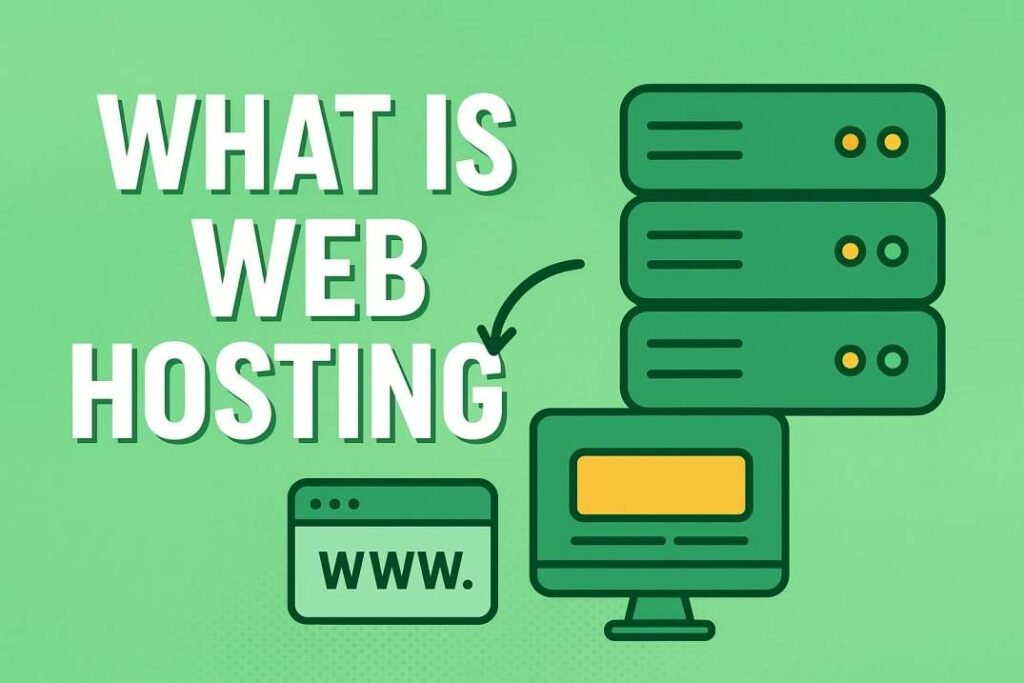What is Web Hosting and How Does It Work?
In today’s digital age, having a website is essential for businesses, bloggers, and even personal brands. But before your website goes live on the internet, you need two critical things: a domain name and web hosting. Many beginners understand what a domain is (your website’s address), but web hosting often confuses people.
If you’ve ever wondered what web hosting is, how it works, and which type is best for you, this guide will explain everything in detail—without unnecessary jargon.

What is Web Hosting?
Web hosting is a service that stores your website files (HTML, CSS, images, videos, and data) on a special computer called a server, which makes your site accessible on the internet.
Think of your domain name as your home address and web hosting as the actual house where all your belongings (website files) are kept. Without hosting, your domain is just an empty address.
When someone types your domain name into a browser, their device connects to your hosting server, retrieves your site files, and displays them to the user.
How Does Web Hosting Work?
The process might sound technical, but let’s simplify it step by step:
- You buy a hosting plan from a web hosting company.
- Your website files are uploaded to their servers.
- When a visitor types your domain name, the Domain Name System (DNS) converts it into an IP address.
- The browser sends a request to your hosting server.
- The server responds by sending the website files back to the browser.
- The user sees your website live on their screen.
In short, web hosting works by providing the storage space, server resources, and network connectivity your website needs to be online.
Why Do You Need Web Hosting?
Without web hosting, your website cannot be accessed by anyone on the internet. Hosting services provide:
- Storage for your files, images, and content.
- Bandwidth to handle traffic and deliver content.
- Server performance for faster load times.
- Security features like SSL certificates, firewalls, and backups.
- Email accounts linked to your domain (e.g., info@dpcreations.com).
Different Types of Web Hosting
Not all websites need the same type of hosting. Here are the most common options:
1. Shared Hosting
- Best for: Beginners and small websites.
- How it works: Multiple websites share the same server and resources.
- Pros: Affordable, easy to manage.
- Cons: Limited resources, slower performance during high traffic.
2. VPS Hosting (Virtual Private Server)
- Best for: Medium-sized websites or businesses.
- How it works: A single server is divided into virtual sections, giving you more control.
- Pros: More power and security than shared hosting.
- Cons: Slightly more expensive and requires some technical knowledge.
3. Dedicated Hosting
- Best for: Large businesses and high-traffic websites.
- How it works: You get an entire server dedicated to your site.
- Pros: Maximum control, performance, and security.
- Cons: Very expensive and needs server management skills.
4. Cloud Hosting
- Best for: Growing websites and startups.
- How it works: Your website uses multiple servers in the cloud, ensuring high availability.
- Pros: Scalable, reliable, and fast.
- Cons: Costs can increase with traffic.
5. Managed WordPress Hosting
- Best for: WordPress users who want convenience.
- How it works: The hosting provider handles updates, security, and backups for WordPress sites.
- Pros: Optimized for WordPress, hassle-free.
- Cons: Limited to WordPress sites only.
How to Choose the Right Hosting Provider
When selecting a hosting company, consider these factors:
- Uptime Guarantee: Aim for 99.9% uptime to keep your site live.
- Speed & Performance: Look for SSD storage and good server infrastructure.
- Customer Support: 24/7 support via chat, email, or phone.
- Scalability: Ability to upgrade plans as your site grows.
- Security: Free SSL, malware protection, and backups.
- Pricing: Balance affordability with features.
Popular hosting providers include Bluehost, Hostinger, SiteGround, HostGator, and A2 Hosting.
What Happens After You Buy Hosting?
Once you purchase hosting:
- Connect your domain name to your hosting server using DNS settings.
- Install a content management system (CMS) like WordPress.
- Upload your website files or design your site using a builder.
- Secure your site with an SSL certificate.
- Launch your website for the world to see!
Web Hosting FAQs
What is the difference between domain and hosting?
A domain is your website address (example.com), while hosting is the server space where your site files are stored.
Is web hosting free?
Some companies offer free hosting, but it’s limited and not suitable for professional sites.
Can I build a website without hosting?
No, unless you use free platforms like Blogger or WordPress.com, which still provide hosting on their servers.
Final Thoughts
Web hosting is the backbone of every website. Without it, your site can’t exist on the internet. Choosing the right hosting plan depends on your needs, budget, and technical knowledge. Whether you’re creating a personal blog, a business website, or an online store, investing in quality hosting ensures speed, security, and a great user experience.





